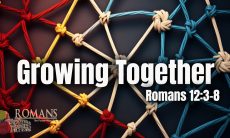In Oatlands, Sydney, Danny and Leila Abdallah faced the unthinkable: a drunk, drugged driver struck and killed their three children and their niece. The day after, a minister told them, “However you conduct yourselves now, the world will follow.” Days later, at the crash site, Leila told reporters, “I don’t hate the driver… I think I forgive him, but I want the courts to be fair.” Their radical forgiveness stunned the world and sparked a movement of mercy. They still grieve deeply—but they refuse bitterness. Their surviving children even pray nightly for the man responsible.
That is what Romans 12:9–21 looks like in real life: sincere love that overcomes evil with good. And Romans 13 shows how that same transformed heart lives as a faithful citizen under earthly authority.
I. The Citizen’s Response to Evil (Romans 12:17–21)
“Repay no one evil for evil… If possible, so far as it depends on you, live peaceably with all… Never avenge yourselves… Do not be overcome by evil, but overcome evil with good.”
A. Resist Retaliation (v. 17)
Retaliation is natural; Christlikeness is supernatural (Matt. 5:38–39; 1 Thess. 5:15). When cut off in traffic, insulted online, or slandered at work—mirror Christ, not the offender.
Practice: Count to ten; pray their name; answer soft for hard (Prov. 15:1).
B. Pursue Peace (v. 18)
Peace isn’t always possible, but it’s always our posture (Heb. 12:14; Ps. 34:14). You control your tone, approach, and attitude—because God first extended peace to you.
Practice: Go first in forgiveness; de-escalate arguments; bless rather than blast (Matt. 5:9).
C. Leave Vengeance to God (vv. 19–20)
Vengeance belongs to the Lord (Deut. 32:35). Jesus entrusted Himself “to Him who judges justly” (1 Pet. 2:23). Kindness to enemies can awaken conscience—“heaping coals.”
Practice: Pray for your enemy; meet a need if you can. Corrie ten Boom forgave a guard by Christ’s power, not her own.
D. Overcome Evil with Good (v. 21)
Evil reproduces itself when we repay in kind; love breaks the cycle (Prov. 25:21–22; Gal. 6:9–10). Jesus prayed, “Father, forgive them” (Luke 23:34), washed Judas’s feet, and restored Peter. That is Kingdom citizenship on display.
II. The Christian and Authority (Romans 13:1–5)
“Let every person be subject to the governing authorities… there is no authority except from God…”
A. Submit with a Willing Heart
Submission is a posture of respect under God’s order (1 Pet. 2:13–14; Titus 3:1). We obey laws unless they contradict God’s commands (Acts 5:29). Be known as a good neighbor and citizen.
Illustration: “Salute the uniform.” We honor the office because we trust the God who established authority.
B. Recognize God’s Sovereignty
Paul wrote under Rome’s rule. Yet God is still at work (Dan. 2:21; John 19:11). Constant contempt for leaders betrays little confidence in providence.
Practice: Complain less, intercede more (1 Tim. 2:1–2).
C. Respect Authority’s Role
Government restrains evil and commends good (Rom. 13:3–4). Doing good typically removes fear and frees us to focus on Gospel witness.
D. Obey with Conscience
We submit not merely to avoid penalty but to honor God (v. 5; Rom. 14:12). Integrity is obedience when no one sees.
Conclusion: Living as Dual Citizens (Romans 13:6–7; Matt. 22:21)
Pay what is owed—taxes, revenue, respect, honor. The mark of heaven’s citizens isn’t how fiercely we strike back, but how faithfully we reflect Christ. The Abdallahs’ forgiveness didn’t minimize justice; it magnified grace. Evil wants to multiply. It can’t where love interrupts the cycle.
Tomorrow, when insult or unfairness stings, remember: the world is watching whose citizen you are. Let them see Jesus. Break the cycle. Overcome evil with good.















